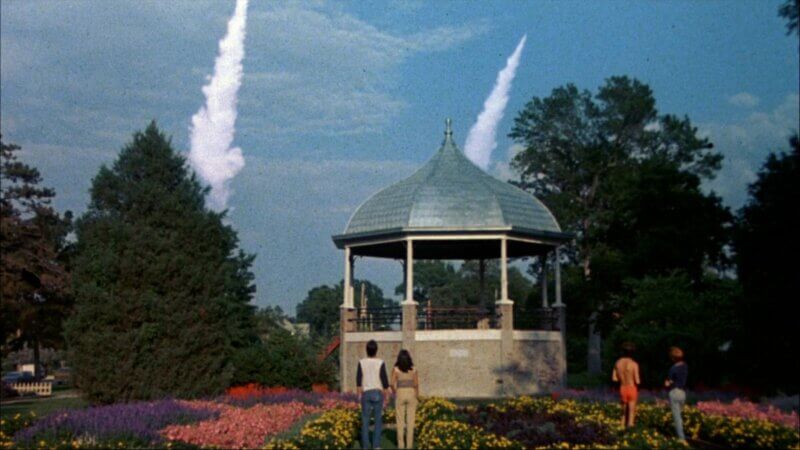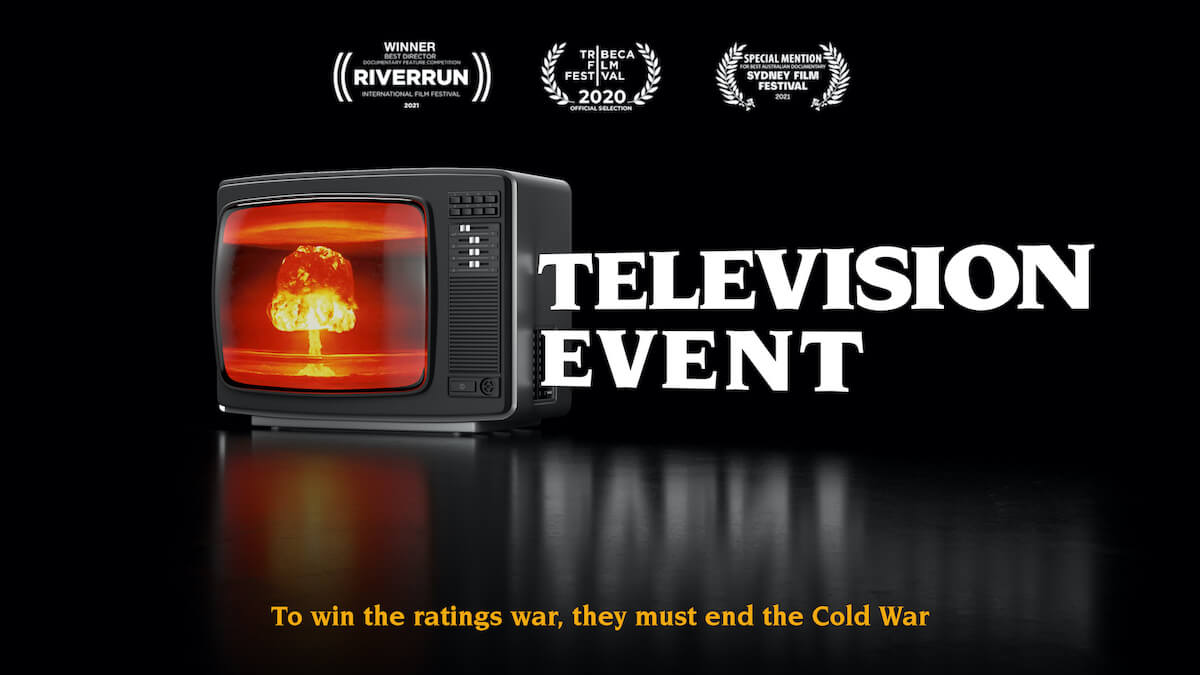As fears of nuclear confrontation escalate, this film is a burst of sanity and hope

Screenshot from “The Day After,” a 1983 ABC-TV movie about the ravages of nuclear war in a small Kansas city.
“My team produced this film in the hopes of waking up the public, so we don’t sleepwalk into the apocalypse.”
— Jeff Daniels, Director of Television Event
As the murderous wars in Ukraine, Gaza, and Lebanon continue to escalate and push the risks of nuclear confrontation to dangerous new levels, it’s as good a time as any to revisit what happened the last time the world seemed to be hurtling toward self-immolation and full-scale global annihilation.
That’s why we urge you to check out award-winning filmmaker Jeff Daniels’s riveting and immersive new documentary Television Event. In the film, Daniels takes us inside the making of The Day After, a controversial 1983 TV movie about the horrors of nuclear war that transfixed the nation, bridged ideological differences, and moved the direction of U.S.-Soviet nuclear policy in a saner direction.
“My team produced this film in the hopes of waking up the public, so we don’t sleepwalk into the apocalypse,” Daniels said. “The Day After proved that, however polarized we may be ideologically, we can still come together, inform ourselves, and act to prevent the obscene devastation caused by nuclear weapons.”
Television Event tells the unlikely story of how The Day After, a no-holes-barred portrait of an apocalyptic nuclear strike on Middle America, came to be produced and broadcast on ABC, shattered ratings records, and put pressure on U.S. and Soviet leaders to return to the negotiating table and draw back their arsenals.
Television Event is now available to purchase in a variety of formats. If you’d like to book a public screening of the film, please fill out this form and we’ll be back in touch.
At once darkly funny and deadly serious, Television Event is a superb resource for educators and activists looking to raise awareness about the accelerating threat of nuclear war, the absurdity of current nuclear deterrence policy, and the inspiring history of the anti-nuclear movement.
Perfect for courses that examine politics and pop culture, U.S. militarism and war, American mass media, media production, social change movements, television history, propaganda and public opinion.

“By turns horrifying, incisive, and sometimes laugh-out-loud funny, Television Event chronicles the efforts of an unlikely group of writers, directors, actors, and producers to make a film graphically representing the impact of nuclear war on a midwestern community. By vividly documenting the massive constraints on making commercial media critical of militarism and the Cold War arms race, this film highlights the continued importance of media-making that challenges war-making by asking us to confront the impact of war on the civilian populations that must pay its price.”
— Carol A. Stabile | Professor of Women’s, Gender and Sexuality Studies at the University of Oregon and author of The Broadcast 41: Women and the Anti-Communist Blacklist
“This absorbing documentary returns us to an extraordinary moment in the politics and popular culture of 1980s America … Fast-paced and gripping, Television Event explores not only the story behind The Day After‘s unlikely production and its searing impact on television viewers, but also its influence on Ronald Reagan himself, who pivoted from endorsing the idea of a limited nuclear war to the realization that such a war must never come to pass. A powerful film about how culture can shape history.”
— Natasha P. Zaretsky, author of Radiation Nation: Three Mile Island and the Political Transformation of the 1970s
“Television Event is a compelling account of a unique moment of intersection in the history of American entertainment and US foreign policy. It shows how a small group of storytellers dramatized the reality of nuclear war and rallied a country and its president to embrace change. Moving in its own right, Television Event deserves a wide audience and a place in contemporary discussion of how entertainment should respond to the global challenges of our times.”
— Nicholas J Cull, USC Annenberg School for Communication and Journalism
“At a time when fears of international conflicts escalating to nuclear war are again rising, Television Event delivers a powerful reminder of how a controversial 1983 movie galvanized many Americans and helped to move the United States and the Soviet Union away from the brink of a dangerous confrontation. The Day After became a classroom topic across America in the early 1980s. It deserves to be discussed in classes again today, and Television Event offers a much-needed spur.”
— David Foglesong, Professor of History at Rutgers University and author of The American Mission and the “Evil Empire”
“A brilliant, important film. In an era when the threat of nuclear war has returned, it is critical that we all remember what the reality of nuclear fear looks like. Television Event carefully contextualizes the The Day After, placing it within the moment when the global anti-nuclear movement confronted Soviet and American brinksmanship. The movie captures the key moment when nuclear fear made its way into the American living room.”
— Margaret Peacock, Associate Professor of History at University of Alabama
“Under the Reagan administration, nuclear warfare became a concern for many, but it may have taken a seemingly ordinary made-for-TV movie to allow Americans to come to terms with the bipartisan nature of this far-reaching issue. Forty years after the airing of The Day After, and in a “post-Cold War setting,” Television Event highlights the extent to which our world is still as precarious as it was during the Cold War. While this documentary can and should draw many audiences, it is a must see for those who are interested in popular culture and its impact on audience perceptions of foreign policy.”
— Diana Cucuz, Adjunct Professor of History at University of Toronto
“An absolutely riveting, highly entertaining and important story of the 1983 ABC TV movie, The Day After. … This documentary is not only a remarkable, often oddly funny, look at the broadcast network machinations at the time, but also a game-changing show business event that directly affected then-President Ronald Reagan and his whole attitude towards the possibility of a nuclear holocaust.”
—Deadline Hollywood
“A blast. Witty, moving, and engaging … Taps into the heightened anxiety over U.S.-Soviet tensions, the growing nuclear stockpiles that went with them, and the response of the Reagan administration to The Day After’s anti-nukes message.”
—The Hollywood Reporter




